Overview
Bank reconciliation is a vital process for freelancers, as it ensures that internal financial records align with bank statements, promoting accuracy and revealing discrepancies.
Many freelancers may worry about managing their finances effectively amidst fluctuating income streams. By regularly conducting bank reconciliations, freelancers can significantly improve the precision of their financial records, which is essential for effective budgeting and informed decision-making.
This means that maintaining accurate records not only helps in tracking expenses but also supports better financial planning. Ultimately, embracing this practice can empower freelancers to navigate their financial landscape with confidence.
We encourage you to consider integrating regular bank reconciliation into your routine for enhanced financial clarity.
Introduction
In the ever-evolving landscape of freelancing, managing finances can often feel like navigating a complex maze. Many freelancers share concerns about expense management, particularly when it comes to aligning their internal financial records with bank statements.
Bank reconciliation emerges as a crucial practice that not only ensures accuracy and transparency but also helps identify discrepancies and safeguards against fraud. This essential process empowers freelancers to maintain a clear picture of their financial health amid fluctuating income streams.
Furthermore, as the freelance workforce continues to grow, understanding and implementing effective bank reconciliation practices becomes increasingly vital for achieving financial stability and informed decision-making.
Innovative tools like Kulud simplify this process, allowing freelancers to focus more on their creative pursuits while ensuring their financial management remains robust and efficient. This means that with the right tools, freelancers can navigate their financial landscape with confidence.
Understanding Bank Reconciliation: A Freelancer's Essential Guide
The procedure of bank reconciliation is essential for independent workers, as it involves comparing internal accounting records with bank statements to ensure balance consistency. This practice is crucial not only for identifying discrepancies, errors, or potential fraudulent transactions but also plays a pivotal role in maintaining accurate monetary records. For independent workers, who often navigate inconsistent income streams, a clear understanding of their financial situation is paramount for effective budgeting and planning.
The significance of bank reconciliation cannot be overstated. In 2025, statistics suggest that independent workers who regularly conduct bank reconciliation are 30% more likely to maintain precise monetary records, which directly affects their capacity to make informed business decisions. Furthermore, expert opinions highlight that consistent bank reconciliation practices can save independent workers significant time and resources.
As Georgi Knyazhev, a freelancer, noted, "Instead of spending 3 hours each month searching for and collecting invoices for my companies in Estonia, I now spend just 5 minutes. It's a huge time saver." This illustrates the profound impact Kulud can have on financial management.
Jan Džemesjuk, a creative producer and freelancer, also shares his experience: "I just started working as a freelancer and accounting is a big and confusing task for me. I am glad that Kulud helps me with a big part of the bookkeeping process." This perspective underscores the importance of having a reliable tool like Kulud, especially for those new to freelancing.
To commence the settlement process, begin by collecting your financial statements alongside your internal records, including invoices and receipts. This collection of documents will serve as the foundation for a thorough review. Effective methods for bank reconciliation for small business proprietors stress the importance of careful attention to detail and frequent updates to accounting records.
By adopting these practices, independent workers can ensure timely collections and precise reporting, ultimately leading to improved economic health and effective bank reconciliation.
Popular accounting applications like Intuit QuickBooks Online, Wave, and Xero can be useful resources for independent workers in organizing their financial documents and aiding the balancing process. Case studies illustrate the effectiveness of these practices. For instance, John Peterson, a Senior Accountant at Bolt, stated, "This product has been a game-changer for our accounting team! Finding invoices for our monthly reports is now effortless, and the improved communication with business owners has streamlined our workflow."
Kulud automatically finds, extracts, and categorizes receipts and invoices from all your inboxes, then matches them with the related financial transactions. This feature not only streamlines the bank reconciliation process but also conserves precious time for independent workers.
In summary, the bank reconciliation procedure is a reliable action that independent workers should emphasize. By dedicating themselves to consistent review, they can improve their management capabilities, paving the way for sustained business growth, supported by automated solutions like Kulud that simplify the entire process.
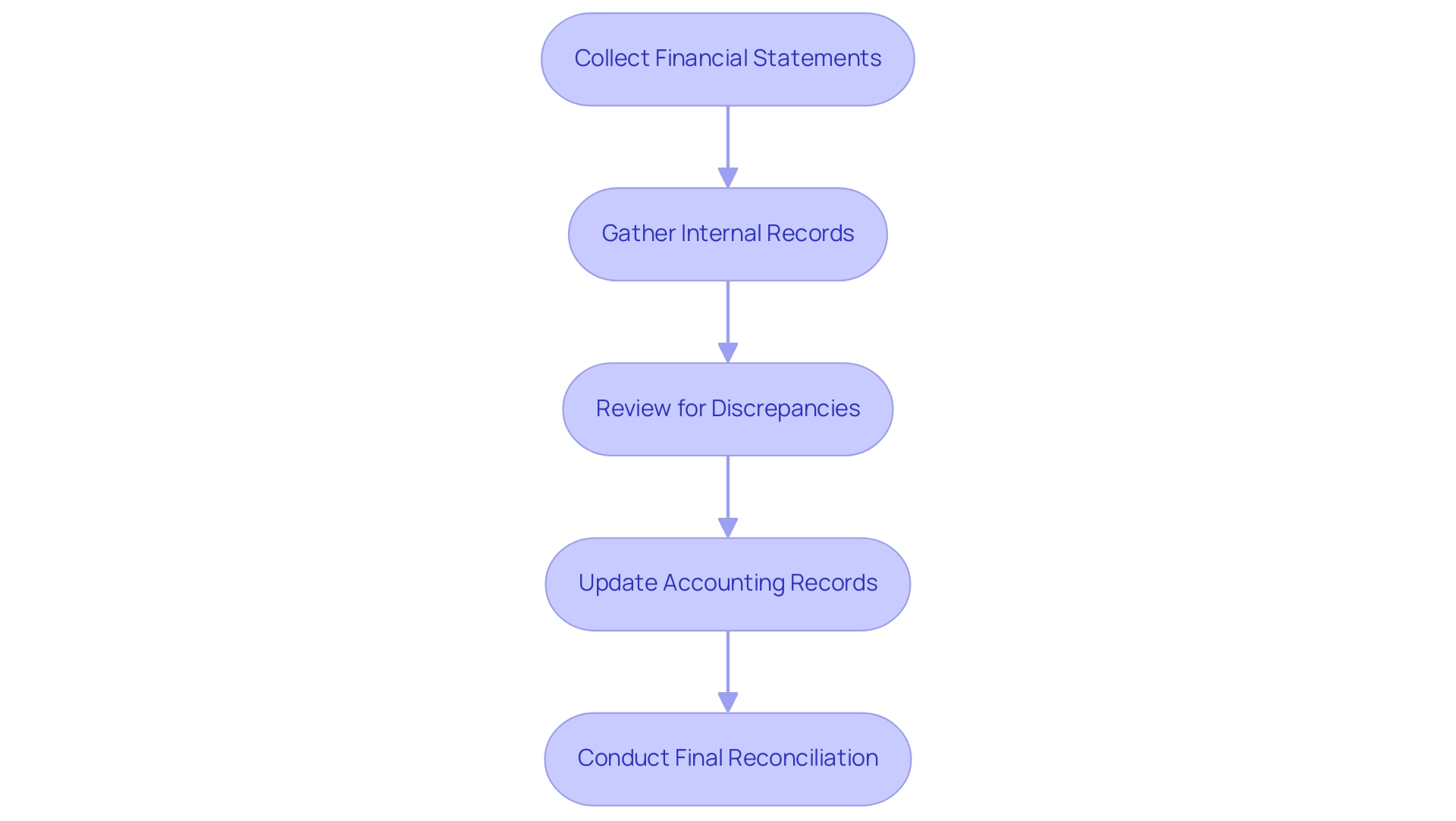
Why Bank Reconciliation Matters for Freelancers
For independent workers, account balancing transcends being a mere routine activity; it forms the bedrock of effective money management. Given the inherent fluctuations in earnings that independent workers often face, maintaining a clear and precise overview of their financial status is crucial. Regular bank reconciliation presents several significant advantages:
- Identifying Errors: With Kulud's automated receipt capture, independent workers can quickly uncover discrepancies by comparing their records with bank statements. This streamlines the bank reconciliation process, ensuring that bookkeeping remains accurate and trustworthy.
- Preventing Fraud: Routine bank reconciliation acts as a safeguard against unauthorized transactions, allowing freelancers to detect potential fraud early, thus protecting their finances with Kulud's secure platform.
- Budgeting: Kulud simplifies the creation of realistic budgets that reflect verified income and expenses, which enhances resource planning and allocation.
- Tax Preparation: Accurate and organized documentation generated by Kulud streamlines the tax filing process, ensuring that all income and expenses are accounted for, potentially leading to savings and reduced stress during tax season.
- PDF Report Export: Freelancers can effortlessly export their financial reports in PDF format, simplifying their accounting and financial tracking processes.
- Email Analysis for Receipts: Kulud can analyze previous emails for receipts, automatically extracting relevant information and saving independent workers hours of manual searching.
As the freelance workforce continues to expand—expected to lead the American labor market—grasping the significance of financial statement alignment becomes increasingly vital. Statistics indicate that 16.9 million Americans now identify as digital nomads, underscoring the growing reliance on freelance work. This trend highlights the necessity for independent workers to adopt robust money management practices, including bank reconciliation and regular account balancing, to enhance their economic stability and make informed business decisions.
Furthermore, financial consultants emphasize that efficient account balancing not only aids in maintaining precise records but also fosters a sense of control over one’s financial environment. As Georgi Knyazhev states, "Kulud has transformed my accounting processes, allowing me to save time and streamline communication with my accountants." This sentiment encapsulates the broader impact of effective monetary management tools on the success of independent workers.
Additionally, a case study reveals that in low-income economies, up to 80% of the workforce may be engaged in freelance work, illustrating the economic dynamics influencing this sector. Moreover, the varying fees imposed by web designers in advanced versus emerging nations highlight the economic challenges independent workers may encounter, reinforcing the importance of efficient monetary management techniques such as account balancing. As independent workers navigate the complexities of their financial management, the advantages of account balancing become increasingly evident, empowering them to focus on growth and success in their endeavors.
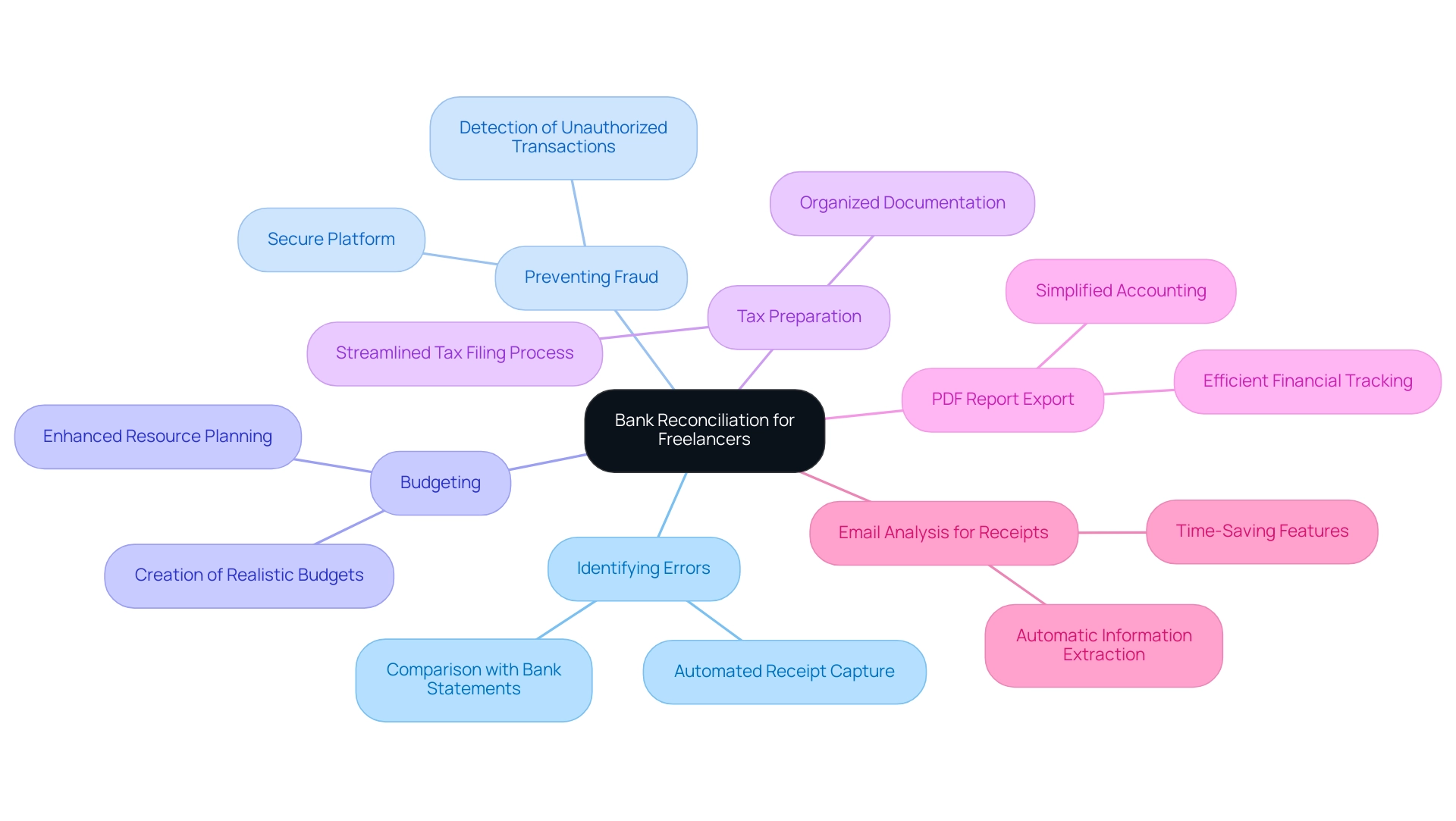
Step-by-Step Process for Effective Bank Reconciliation
To execute an effective financial reconciliation, freelancers often face challenges in managing their expenses. To address these concerns, it is essential to follow a structured approach:
- Gather Documents: Begin by collecting all pertinent monetary documents, including your account statements and internal records such as invoices and receipts.
- Compare Transactions: Review your financial statement and systematically check each transaction against your internal records. Mark off transactions that align, ensuring accuracy in your financial tracking. With Kulud's automated expense management solution, you can easily capture invoices and receipts, eliminating the need for manual sorting or downloads. Furthermore, you can activate the automatic search feature to streamline the bank reconciliation process.
- Identify Discrepancies: Pay close attention to any transactions that do not match. Common discrepancies may arise from bank fees, missed entries, or errors in recording. Understanding these discrepancies is crucial, as studies indicate that nearly 30% of bank reconciliation issues stem from such errors. For instance, timing differences between internal records and external statements can lead to temporary discrepancies, which can be minimized during the bank reconciliation process by implementing cutoff procedures and maintaining clear communication with financial institutions.
- Adjust Records: Make the necessary adjustments in your internal records to address any discrepancies identified. This could involve adding missed transactions or correcting any errors found during your comparison. Kulud's ability to link your financial account and automatically perform bank reconciliation by matching invoices with transactions ensures that your records remain precise and current.
- Bank Reconciliation: After making adjustments, ensure that your adjusted internal balance matches the balance on the bank statement. If both figures match, your bank reconciliation is complete. Kulud further simplifies this step by allowing you to easily export data for VAT or annual reports directly to your accounting software or share it with your accountant.
- Document the Process: Maintain a detailed record of your reconciliation process, including any discrepancies and adjustments made. This documentation is essential for future reference and audits, ensuring transparency in your bank reconciliation and overall resource management. With Kulud's advanced encryption and security audits, including the Cloud Application Security Assessment (CASA) validated by the App Defense Alliance, you can trust that your financial data remains confidential and secure throughout the process.
By diligently following these steps and leveraging tools like Kulud, freelancers can uphold accurate financial records and keep their bookkeeping current. The future of payment settlement is increasingly leaning towards automation and data-driven solutions, leveraging AI and machine learning. Tools such as Vena Bank Reconciliation Software can automatically download statements and compare transactions, removing manual data entry and significantly simplifying the process of aligning accounts. Adopting such tools can decrease the time dedicated to bank reconciliation from hours to just minutes, enabling independent workers to concentrate on their primary business tasks. As George Knyazhev observed, automation has a transformative effect on accounting processes, facilitating better communication with accountants and more efficient management of monetary data. Additionally, Vena provides templates created by finance professionals to eliminate common errors in account balancing, offering practical resources for freelancers seeking to enhance their balancing processes. Kulud, built by top founders and tech professionals from the Baltics & Nordics, further enhances its trustworthiness in providing secure and automated expense management solutions.
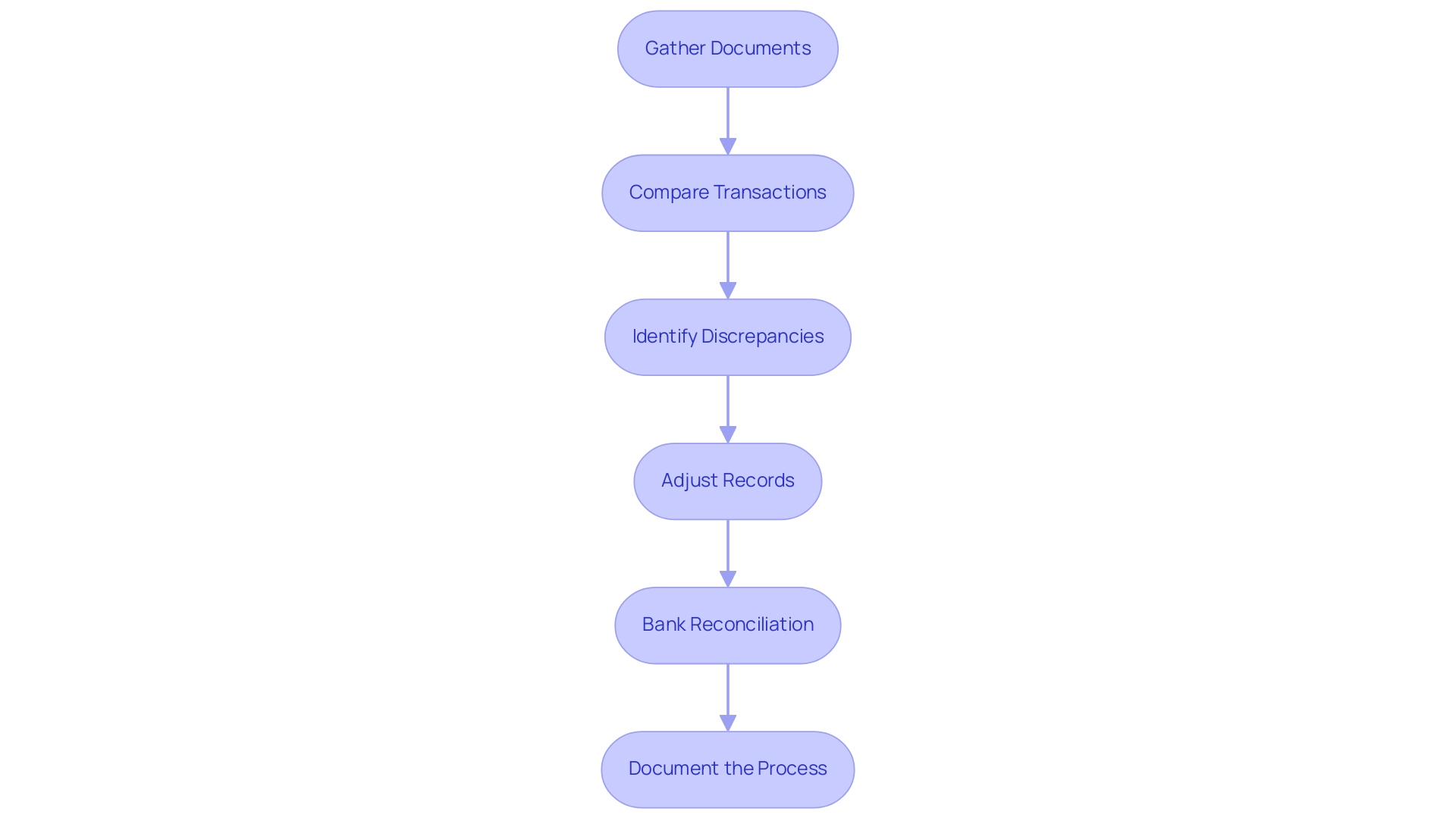
Overcoming Common Challenges in Bank Reconciliation
Freelancers often encounter various challenges during the bank reconciliation process, which can hinder their financial management. Understanding these concerns is the first step toward effective expense management. Here are some common issues and effective strategies to overcome them:
- Timing Differences: Transactions may appear on your financial statement before being recorded in your accounting books. To mitigate this issue, establish a consistent schedule for recording transactions, ideally aligning it with your bank statement cycle. This proactive approach helps minimize discrepancies. As Jason Bryan Silverstein notes, addressing timing differences is crucial for maintaining precise accounting records.
- Missing Transactions: It's not uncommon for invoices or receipts to be overlooked, leading to incomplete records. Utilizing automated tools like Kulud can significantly enhance tracking efficiency by automatically extracting and categorizing invoices and receipts from your inbox. This ensures that no transaction goes unnoticed, allowing freelancers to maintain comprehensive monetary records effortlessly.
- Unexpected Charges: Discrepancies can arise from unanticipated financial fees. Consistently examining your bank statements enables you to recognize these charges and include them in your records, thereby ensuring precision in your bookkeeping.
- Errors in Recording: Human error is a common pitfall when entering transactions. To reduce mistakes, double-check your entries for accuracy and consider leveraging Kulud's automated solutions, which minimize manual input and enhance the reliability of your financial data.
- Time Constraints: Freelancers often manage several duties, making it difficult to allocate time for balancing accounts. To combat this, allocate specific time each month solely for settling tasks. This organized method avoids the procedure from becoming burdensome and guarantees that your monetary records stay current.
By acknowledging these obstacles and applying specific strategies, independent workers can simplify their bank reconciliation process, ultimately resulting in more effective management of finances with Kulud. With nearly 70% of the global freelance workforce under the age of 35, the need for effective time management and precise monetary practices is more crucial than ever. As the freelance economy expands, particularly in regions like Asia where 84% of hiring managers have outsourced work to freelancers, addressing these bank reconciliation issues becomes essential for sustaining business success.
Furthermore, as sustainability reporting emerges in the finance industry, aligning financial practices with broader environmental, social, and governance criteria may resonate with the values of today's freelancers. Additionally, with Kulud, you can easily export your data for VAT or annual reports, simplifying compliance and reporting processes. The platform allows you to connect your financial account seamlessly, enabling automatic matching of invoices with transactions, and the automatic search feature ensures that you never miss a document. Forget manual sorting or downloads, and let Kulud handle your expense management efficiently.
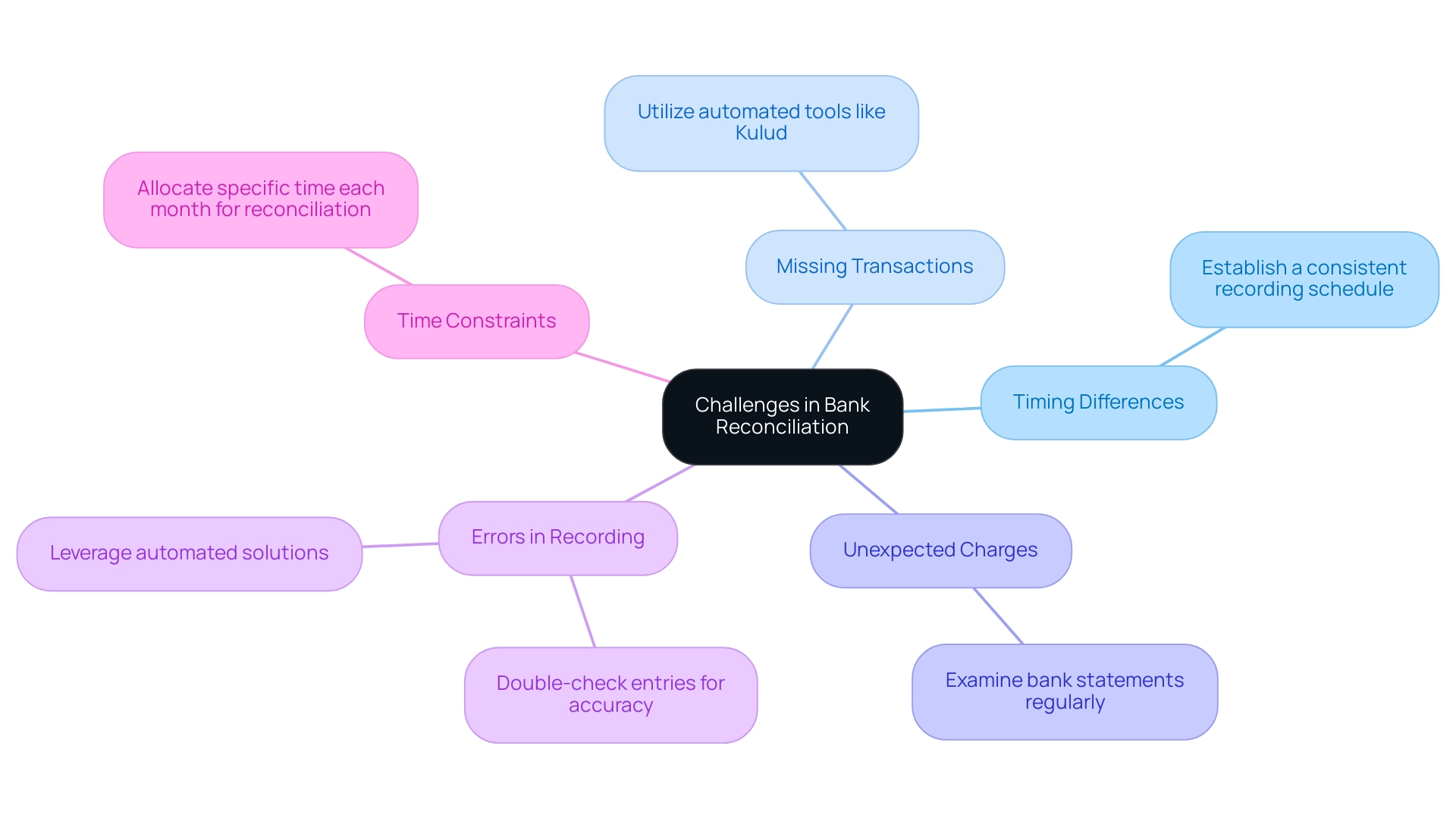
Leveraging Technology for Streamlined Bank Reconciliation
Technology plays a crucial role in optimizing bank reconciliation for independent workers, enabling them to manage their finances more effectively. As Roman H. Kepczyk, Director of Firm Technology Strategy for Rightworks, emphasizes, "The integration of technology in accounting is not just a trend; it's a necessity for contemporary professionals to thrive in a competitive landscape." Many freelancers express concerns about managing expenses efficiently. Fortunately, there are several strategies to leverage technology effectively:
- Accounting Software: Consider implementing platforms like Kulud, which automate the extraction and categorization of receipts and invoices. This eliminates the need for manual sorting or downloads. With Kulud, you can log in using your business email (Gmail supported), add all your accounts, and capture invoices and receipts effortlessly. This significantly reduces the need for manual data entry, allowing independent workers to focus on their core tasks. Kulud's features, including automated invoice processing and smart reconciliation with financial transactions, are specifically designed to meet the needs of freelancers. By linking your financial account, Kulud matches invoices with your transactions, ensuring accuracy.
- Bank Integration: Connecting your bank account directly to your accounting software allows for the automatic import of transactions. This integration simplifies the matching of records, ensuring accuracy and saving valuable time. Kulud makes it straightforward to select the date range or activate automatic search for efficiency.
- Automated Alerts: Utilizing automated alerts for discrepancies or unusual transactions is a proactive approach that enables independent workers to respond swiftly to potential issues, enhancing their financial oversight.
- Mobile Applications: Mobile apps that facilitate expense tracking and account reconciliation on the go are invaluable. This flexibility ensures that freelancers can stay on top of their finances, no matter where they are.
- Cloud Storage: Storing financial documents in the cloud provides easy access and organization. Kulud allows for easy export for VAT or annual reports, streamlining the process of gathering necessary documents for settlement.
By embracing these technological advancements, independent workers can significantly streamline their bank reconciliation processes, ultimately saving time and reducing the risk of errors. As the freelance economy continues to grow, with a substantial presence of younger workers—52% of Gen Z and 44% of millennials involved in freelance work—adopting these tools becomes increasingly essential for maintaining efficiency and precision in managing finances. Key trends for 2025, such as the normalization of remote work and the rise of AI and automation tools, further highlight the importance of leveraging technology in accounting. Are you ready to enhance your financial management? Explore how Kulud can transform your approach to expense management today.
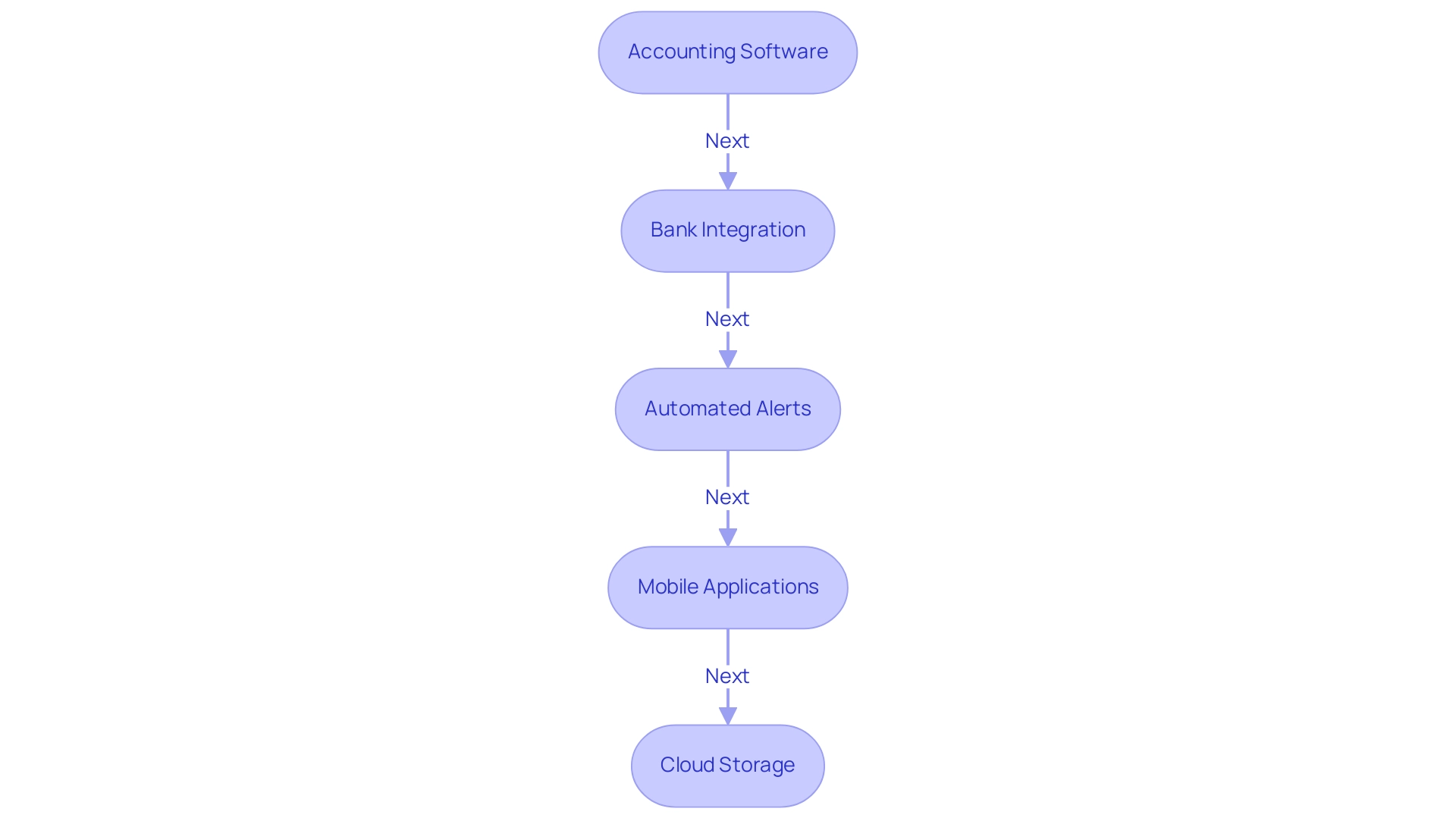
Best Practices for Maintaining Accurate Financial Records
To maintain accurate financial records, freelancers should adopt the following best practices:
- Regular bank reconciliation is essential. Schedule monthly reconciliations to ensure your records are always up to date. This practice not only aids in recognizing discrepancies but also promotes a proactive approach to managing finances. With Kulud's automated expense management solution, independent workers can achieve bank reconciliation effortlessly, significantly reducing the time spent on this task.
- Organized documentation is crucial. Keep all monetary documents organized and easily accessible. Utilizing digital tools like Kulud can streamline the categorization and storage of receipts and invoices, making it easier to retrieve information when needed. Kulud is trusted by top founders and tech professionals from the Baltics & Nordics, assuring users of its reliability.
- Consistent record keeping is vital. Record transactions consistently and promptly to avoid backlog and errors. This habit is particularly important, especially considering that 75% of new independent workers started their careers during economic downturns, highlighting the need for economic stability. Georgi Knyazhev, a freelancer, shares, "Instead of spending 3 hours each month searching for and collecting invoices for my companies in Estonia, I now spend just 5 minutes. It's a huge time saver."
- Reviewing fiscal reports regularly is necessary. Examine fiscal statements to understand your cash flow and make informed decisions. This practice is essential for freelancers to navigate the complexities of their economic landscape effectively. As John Peterson, Senior Accountant at Bolt, states, "This product has been a game-changer for our accounting team! Finding invoices for our monthly reports is now effortless, and the improved communication with business owners has streamlined our workflow."
- Seeking professional help may be beneficial. If necessary, consult with a monetary advisor or accountant to ensure your practices are sound. Expert guidance can provide valuable insights into maintaining organized documentation and optimizing your financial strategies.
In addition to these practices, independent workers can benefit from Kulud's advanced encryption and security audits, which ensure their data remains secure and private. The solution also features unlimited email processing and smart bank reconciliation, making it a comprehensive tool for managing finances.
By adopting these best practices, independent workers can improve their monetary management and secure long-term success. The freelance market is expanding, with projections indicating a 15% annual growth in the AI sector until 2030, highlighting the increasing opportunities available. As Kyle Prinsloo, Founder of Client Manager, noted, "The freelance market is bigger than ever before, and it's poised to keep growing."
Adopting effective money management strategies, especially with tools like Kulud, will enable independent workers to concentrate on expanding their enterprises while keeping precise fiscal records. Additionally, freelancers should be aware that platforms like Upwork charge a 10% service fee on services rendered, which is an important consideration in their financial planning.

Conclusion
Freelancers must recognize the critical importance of bank reconciliation as a foundational practice for effective financial management. By regularly comparing internal records with bank statements, freelancers can identify discrepancies, prevent fraud, and maintain accurate financial documentation. This proactive approach not only enhances budgeting and tax preparation but also contributes significantly to overall financial stability.
Furthermore, the integration of innovative tools like Kulud streamlines this essential process, allowing freelancers to automate tedious tasks and focus on their core creative pursuits. With features that simplify receipt capture and transaction matching, Kulud empowers freelancers to manage their finances with confidence and efficiency, ultimately leading to informed decision-making and sustained business growth.
As the freelance workforce continues to expand, adopting robust financial practices, including regular bank reconciliation, becomes increasingly vital. This means that by implementing these best practices and leveraging technology, freelancers can navigate their financial landscape effectively, ensuring they remain competitive and successful in an ever-evolving market. Embracing these strategies today will pave the way for a more secure and prosperous future in freelancing.



